Amy Novak, EdD
Amy Novak, EdD, became the 14th president of St. Ambrose University on Aug. 7, 2021.
Under Dr. Novak's leadership, St. Ambrose has implemented innovative technology in the classroom through augmented and virtual learning; has reimagined learning across one's lifespan, adding a host of certificate and online program opportunities; and has invested in partnerships with local and regional businesses to ensure students are equipped with the skills they need to be successful when entering the workplace upon graduation.
Her career in higher education began at Dakota Wesleyan University in her native Mitchell, South Dakota, in 2003. Before entering higher education, she worked in the private sector as she, her husband Ken, and their growing family traveled the country and the world during Ken's career in the U.S. Air Force. The Novaks both are graduates of the University of Notre Dame.
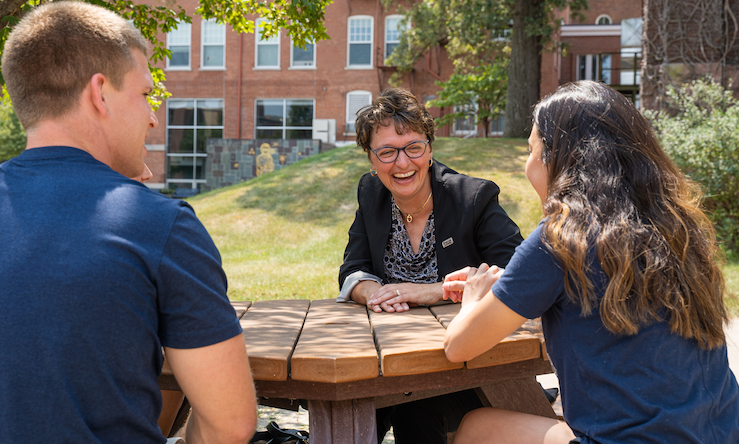
About the President
Amy C. Novak, EdD, became the 14th president of St. Ambrose University on Aug. 7, 2021, and was inaugurated on Oct. 1, 2021, accepting her charge with a focus on inclusivity and collaboration under the invitational theme, Come To The Table.
At St. Ambrose, Dr. Novak has prioritized finding new and innovative models of teaching and learning as we enter a new era of work. She is partnering with community leaders to address employer needs, and celebrating the university's historic commitment to Catholicity, social justice, and service.
Under her leadership, St. Ambrose launched a new strategic plan, Agile Ambrose, designed to prepare the university to meet the evolving needs of learners across their lifespan. Dr. Novak's efforts include collaborating with businesses to pilot XR technologies in classrooms, launching St. Ambrose University's Nano Nagle Online School of Nursing to support place-bound learners across America, and securing grants to support work-based learning initiatives. These achievements have helped the university ensure learning remains relentlessly relevant while honoring the importance of cultivating skills embedded within the traditional liberal arts disciplines.
The university's recent enrollment growth and success in retention is a testimony to the development of an agile culture on the campus that embraces change and best practices in student learning and engagement.
In January 2024, the university will open Higgins Hall for Innovation and Human-Centered Design. This learning laboratory will transform how we educate and deliver a customized experience for our students, creating a person-centered delivery model for higher education that prepares our learners for the next generation of work and community service.
Initiatives such as the Innovation Summit, where Dr. Novak convenes business and community leaders from across the Midwest, have helped guide her vision for the university's future. In the initial summit, St. Ambrose University sought input on how it can prepare its students to meet business, industry, and nonprofit needs in a new age of human work. The most recent summit focused on fostering a growth mindset around learning that is developed in the classroom and built for the workplace.
Novak earned a Doctor of Education degree in interdisciplinary leadership from Creighton University in 2014, a Master of Science in social and applied economics from Wright State University in 1997, and a Bachelor of Arts in History from the University of Notre Dame in 1993.
Dr. Novak is a passionate advocate for students and speaks frequently on issues of innovation, workforce development, leadership, and faith. She serves as the president of the NAIA Council of Presidents and is active in national, regional and local associations. She and her husband Ken are parents to eight children and delight in welcoming nearly 3,000 other students to the St. Ambrose table.
The President's Office
Officers of the Board
Renee Citera SAU 1981 - Interim Chair of the Board, Founder, RGC Consulting Services
Laura ‘Divot' Ekizian SAU 1992, 1997, Vice Chair of the Board, President, Quad City Bank & Trust
Paul Sachs SAU 1976, Vice Chair of the Board, Managing Director, Protiviti, Inc.
Amy C. Novak, EdD - President, St. Ambrose University
Members of the Board
Brian Bassier SAU 1991 - Vice President (CFO) and Treasurer, The Valley Group
John Bear SAU 1988, 1992 - Retired Chief Technical Officer-Manufacturing Americas, Nestle Purina PetCare Co.
Tom Berthel SAU 1974, 1993 - Chief Executive Officer, Berthel Fisher & Company
Ken Brune SAU 1967 - Lawyer, Brune Law Firm
Renee Citera SAU 1981 - Founder, RGC Consulting Services
Phil Doherty SAU 1978 - Retired SVP/General Manager and CFO, Chicago Tribune Media Group
Divot (Laura) Ekizian SAU 1992, 1997 - President, Quad City Bank & Trust
Tom Higgins SAU 1967 - Co-Founder and Director, Prosetta Corporation
Lyn Ketelsen SAU 1998 - Founder, KLK Leading Change, Inc.
Mark Kilmer - President & CEO, The Republic Companies
Sr. Vicky Larson - Vice President of the Presentation Sisters, Presentation Sisters of the Blessed Virgin Mary
Brian Lemek SAU 1986 - Owner/Managing Member, Lemek, LLC
Elizabeth Lemek SAU 1986 - Community Leader
Jerry Lyphout SAU 1983, 1991 - President and CEO, Modern Woodmen of America
Thomas Mason, IV SAU 1991 - Sr. Technical Sales Rep, RILCO Lubricants & Services
Fr. Robert McAleer SAU 1967 - Retired Priest
Amy Novak, EdD - President, St. Ambrose University
Joseph O'Rourke SAU 1972 - JRO Investments, LLC, O'Rourke Sales Co.
Paul Sachs SAU 1976 - Managing Director, Protiviti, Inc.
Patricia Snyder SAU 1981 - Vice President Divisional Merchandise Manager, Wal-Mart
Paul Thompson SAU 2002 - Division CFO, Caterpillar, Inc.
Breann Thompson SAU 2005 - Community Leader
Non-Voting Members 2021-2022:
Fr. Chuck Adam, Priest Representative
Kara Baker, President of Staff Assembly
Mark Brauweiler '13, '15, President of Alumni Association
Slade Dias, President of Student Government Association
Dr. Kevin Lillis, Chair of Faculty Assembly
Ireland Stewart, President of Graduate Student Government Association
Toby Arquette, PhD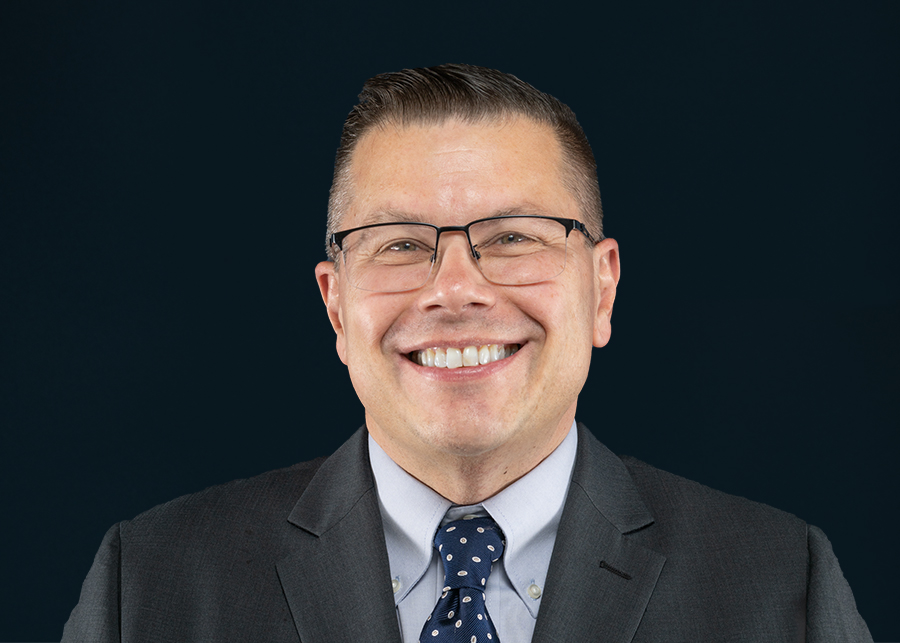
Vice President, Strategic Growth, Marketing, and Digital Transformation
Dr. Arquette joined St. Ambrose in 2022 as the Vice President for Communications and Marketing after having served in multiple roles over 15-years at Aurora University including as Dean of the College of Liberal Arts & Business, Dean of the Dunham School of Business & Public Policy, Chair of the Department of Communication, and Director of the University Honors Program. As a tenured faculty member, Arquette served as the Faculty Senate Chair at Aurora. Arquette is a member of the Higher Learning Commission's institutional accreditation Peer Corp.
Arquette completed his BA in Economics at Wayne State University and MA in Communication Studies from Baylor University before earning a PhD in Communication from Northwestern University. Prior to entering higher education, Arquette worked in the private sector at a marketing agency in client and account management. Arquette's areas of expertise are enrollment management, strategic planning and growth, new academic program innovation, digital communication and technological infrastructure, integrated marketing communication, and consumer insights and analytics. He also holds faculty rank as a professor.
 Anne Gannaway
Anne Gannaway
Vice President, Institutional Advancement
Anne Gannaway manages the university's advancement and development activities, including capital campaigns, annual fund, major gifts, planned estate giving, and alumni relations.
Gannaway began her career at SAU in 2012 serving Alumni and Advancement as the executive director. Long before that, however, Gannaway was already well familiar with the Ambrosian way: her father, Edward Henkhaus, was the university's vice president for finance for many years. Gannaway earned her Master of Arts in higher education from the University of Missouri-Columbia.
Gannaway is married to Ethan Gannaway who is a full professor-adjunct of history at SAU and the associate director of the Academy for the Study of Saint Ambrose of Milan. They have three boys.
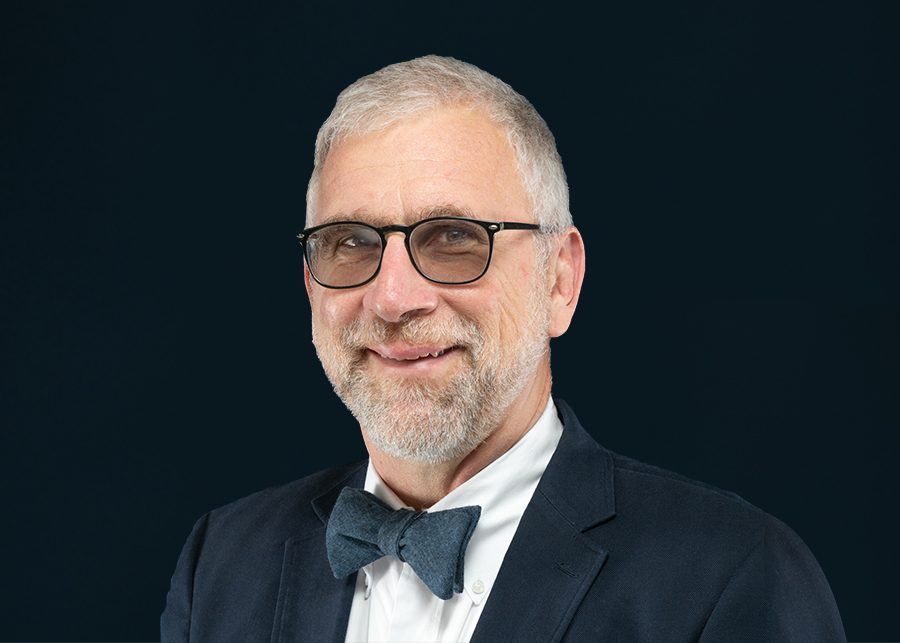 Joseph Roidt, PhD
Joseph Roidt, PhD
Vice President, Academic Affairs
Provost
Joseph Roidt joins St. Ambrose University from Dakota Wesleyan University where he served as the chief academic officer for seven years. Prior to joining Dakota Wesleyan, Roidt held several academic leadership positions, including associate provost and vice president for academic affairs, at Davis & Elkins College in West Virginia.
In his role as provost and vice president for academic affairs at St. Ambrose, Roidt oversees the university's academic programs, the library, and several other academic areas.
Roidt earned his bachelor's degree in sociology from Kent State University and completed his PhD in sociology at the University of Pittsburgh.
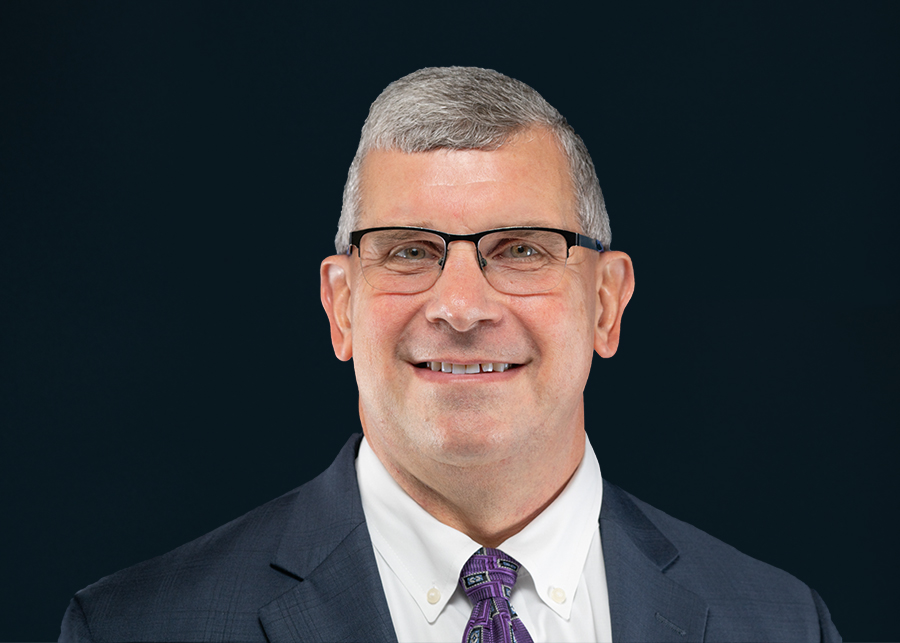 Michael Poster '88
Michael Poster '88
Vice President, Finance
Mike Poster is a Davenport native, who graduated from St. Ambrose University with a bachelor's degree in accounting in 1988. His professional career experience includes three years with KPMG and 17 years with McGladrey and Pullen, working primarily in assurance and financial management consulting. During this time he worked with numerous higher education clients.
Poster joined the administrative staff of St. Ambrose in 2008. He manages the general accounting, human resources, physical plant, student accounts, and information technology offices. He also oversees the compliance area, the university's bookstore operations (through Follett Higher Education Group), and the food service (through Sodexo). He is on the board of Family Resources and the Downtown Davenport Partnership and serves as the chair of the finance committee for both organizations. Poster and his wife, Kelly, have a son and two daughters.
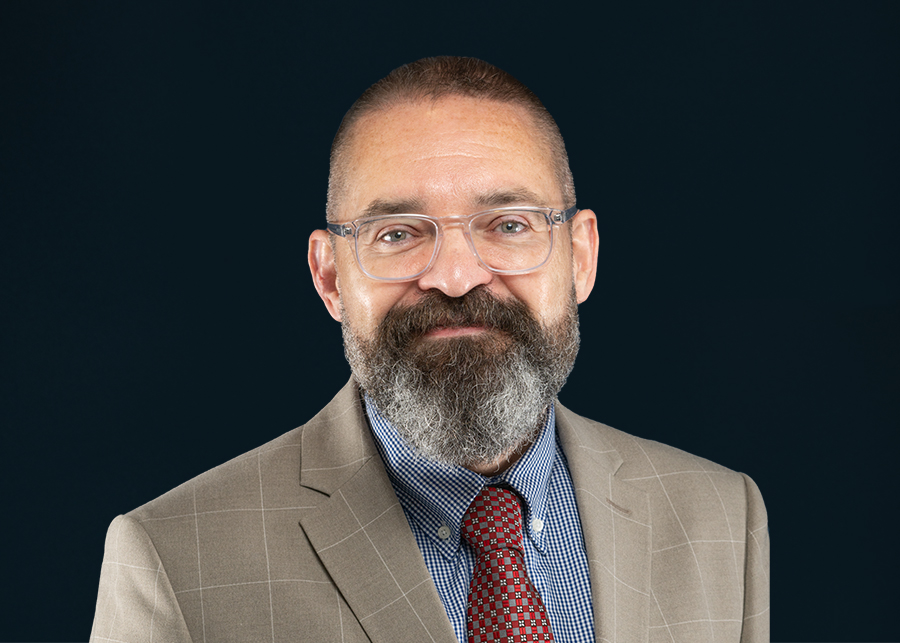 Christopher Waugh, PhD
Christopher Waugh, PhD
Vice President, Student Engagement
Dean of Students
Christopher Waugh is St. Ambrose University's first vice president for Student Engagement. In his role, Waugh oversees student services, including housing and residence life, the counseling center, and student activities, among others. Working closely with the vice president for academic affairs, Waugh is responsible for fostering a holistic experience for all students.
Waugh joined SAU in 2019 as dean of students and associate vice president for academic and student affairs. Before joining St. Ambrose, he served as an associate dean in the Student Affairs Office at Pomona College in Claremont, California.
Waugh earned his bachelor's degree in English and visual communication and his Master of Arts in counseling from Northern Illinois University. In 2011, Waugh completed a PhD in higher education administration at Loyola University Chicago, where he also led graduate-level internship cohorts. His research and educational interests focus on engaging bystanders to help mitigate dangerous drinking situations. Waugh is married to Kristina, a health educator. Kristina and Christopher have one son, Simon.
Rev. Aloysius Joseph Schulte, 1882-1891
Schulte was the first priest that Bishop McMullen ever ordained. After ordination, Schulte worked as a cathedral assistant for a few years before he was slated by McMullen to organize St. Ambrose College. The school had 40 high school students during the first year, and 85 students when he left. During Schulte's presidency, the central portion of Ambrose Hall with the tower was built, although Ambrose Hall was originally only two stories high. After leaving St. Ambrose college, Schulte took a pastorate in Iowa City.
Rev. John Thomas Aloysius Flannagan, 1891-1906
Flannagan was born in Haverville, Massachusetts, and was the second priest on faculty during Schulte's duration as president. While being president of the school, Flannagan's sister Editha ran the Immaculate Conception Academy. The two worked together on many events between schools together. Flannagan promoted boys choir and Latin on campus, and went to the Sacred Heart parish after his term as president. He died January 26, 1926.
Rev. William Shannahan, 1906-1915
Born February 2, 1870, Shannahan, referred to as "Big Bill," was raised in Williamsburg, Iowa. He was the college's first captain of the football team, and graduated from the institution in 1896. He worked in the philosophy department before taking his role as the third president. During his term, the east wing of Ambrose Hall was built, which contained an auditorium, classrooms, and living quarters. After leaving St. Ambrose, Shannahan pastored in Iowa City, until he was named Sacred Heart pastor and Vicar General of the Diocese of Davenport in 1932. He died October 22, 1937.
Rev. William Hannon, 1915-1926
William Hannon was born March 21, 1879. He graduated from St. Ambrose College in 1901. He was ordained in June of 1903 and taught English and history at the school from 1904 until 1912. In 1912 he was named vice president, which he served until 1915 when he took over the presidency. Hannon led the first endowment drive for $200,000, and oversaw the construction of the first gym.
Rev. Ulrich Hauber, 1926-1930
Born June 28, 1885 in Bavaria, Germany, Hauber graduated from St. Ambrose in 1905. After his ordination in 1908, Hauber joined the faculty, which he served as a member of for 48 years. A nationally known biologist, Hauber was the author of many textbooks, pamphlets and articles. At St. Ambrose College, Hauber was the chairman of the Division of Natural Sciences before becoming the fifth president. He died July 1, 1956, and was the first person to be laid to rest in the Chapel of Christ the King.
Rev. Martin Cone, 1930-1937
A Clinton, Iowa native, Cone was a social worker who taught social sciences at St. Ambrose for 16 years before becoming president. He is credited with building the faculty, taking over at a time when priests were paid $15 a month for teaching. Cone also instituted summer sessions on campus. After his presidency he was appointed to the Pastor of Sacred Heart Cathedral, and Vicar General of the Diocese of Davenport.
Rev. Carl Meinberg, 1937-1940
Born January 11, 1889 in Keokuk, Iowa, Meinburg graduated from the college in 1911. He became a member of the St. Ambrose faculty after his ordination in 1914, holding a variety of positions on campus. In his early years, Meinburg served as the head of the library, and was also the director of the choir and the orchestra. He taught in the departments of religion and Spanish, and eventually became the head of the history department and the campus spiritual director before becoming the seventh president of the institution.
Rev. Ambrose Burke, 1940-1956
Ambrose Burke was an English scholar with a Yale doctorate. During his term as president, St. Ambrose built an administration building and Christ the King Chapel. Dealing with many issues surrounding the war, Burke was able to temporarily peak enrollment between 1500 and 1600 students. At one point, Burke also delivered a three-part series during the Catholic Hour on NBC entitled, "Sainthood, the Universal Vocation." He left St. Ambrose after being appointed to St. Mary's Parish in Clinton, Iowa.
Rev. William Collins, 1956-1963
Referred to as "Sailor Bill" since had served in the Navy, William Collins became St. Ambrose's ninth president. From Millersburg, Iowa, Collins graduated from St. Ambrose and had been at the college for 27 years before his appointment. He was chairman of the business and economics departments on campus before becoming president. Hoping to get the school back on track financially, Collins raised tuition and temporarily dropped the football program. During his term, East Hall (Rohlman) was constructed. Collins was active in the American Legion and helped found the Council of World Affairs.
Rev. Sebastian Menke, 1964-1973
Born December 21, 1910, Menke graduated from St. Ambrose in 1934. After his ordination in 1938, Menke returned to St. Ambrose and taught Latin, German, Greek, ancient history and astronomy on campus. He then became the rector for East Hall. Menke served as president during a time when struggles were high for private colleges. During his presidency, South Hall (Cosgrove), Hayes Hall, and the fine arts building were all constructed. After leaving the presidency Menke became the pastor of Sacred Heart Parish. He died April 21, 2002.
Dr. William Bakrow, 1973-1987
William Bakrow was born in Kansas, but moved to Rochester, New York when he was one-month old. He received a doctorate in public administration and education from Indiana University at Bloomingtom. He was given the friendly nickname of "Dollar Bill," since he wiped out a $2 million debt, doubled enrollment, and balanced the budget for eight consecutive years. Under his presidency St. Ambrose ventured into graduate studies with the MBA program. Bakrow was the first layperson to serve as chief operating office at St. Ambrose. He died March 17, 2005.
Dr. Edward Rogalski, 1987-2007
Edward Rogalski came to St. Ambrose as dean of students in 1968. From 1974 to 1980, Rogalski was St. Ambrose's vice president for administration, and from 1981 to 1986, the institution's senior vice president. He served as executive vice president at the time of his appointment to the presidency in 1987. During Rogalski's tenure the university increased total enrollment by more than 70 percent, added nearly 40 additional academic programs, conferred more than 11,000 bachelor's, master's and doctoral degrees, and completed 15 new construction or major renovation capital projects totaling more than $67 million.
Sister Joan Lescinski CSJ, PhD, '21 Hon, 2007-2021
Sister Joan Lescinski served the final 14 years of a half-century-long career in Catholic higher education as president of St. Ambrose University. Under her leadership, St. Ambrose added dozens of new academic programs, seven new or renovated academic buildings, two additional residence halls, and 11 varsity sports with new and enhanced facilities. The 80,000 square foot Wellness and Recreation Center is the most prominent of those brick-and-mortar projects and the largest capital project in University history. Also during her tenure, the University endowment tripled while endowed academic scholarships more than doubled. Sister Joan is an English professor at heart, and she taught at every career stop, St. Ambrose included. She is a native of Albany, N.Y., where she entered the Congregation of the Sisters of St. Joseph Carondelet at age 18 and earned her undergraduate degree in English and a master’s in English Literature from the College of St. Rose. Sister Joan came to St. Ambrose in 2007 after serving as president of St. Mary’s of the Woods College in Indiana from 1998-2007.
Jana Seutter, MBA '20, Senior Assistant
Kim Raap, Executive Assistant
Contact
President Amy Novak
Office of the President
Ambrose Hall
518 W. Locust St.
Davenport, IA 52803
563-333-6213
NovakAmy@sau.edu
